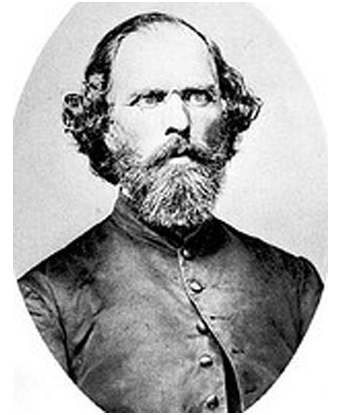Last updated: July 5, 2024
Person
Horace James

An army chaplain from Massachusetts, Horace James was the first superintendent of the Roanoke Island Freedman’s Colony. He was born on May 6, 1818, in Medford, Massachusetts. James graduated from Yale in 1840 and became a minister. He married Helen Leavitt in 1843 and they moved to Wrentham, Massachusetts after Horace became the pastor of Wrentham Original Congregational Church. Their only child, a boy named Horace Melville James, was born March 28. 1846.
In 1853, the family moved to Worcester. While there, James began to speak out against slavery. He found slavery immoral and spoke against it spreading to new U.S. territories. James also delivered many antislavery sermons at his church. He supported a more gradual dissolvement of slavery and for the enslavers to be compensated. On October 29, 1861, Horace James joined the Twenty-fifth Massachusetts Infantry Regiment as an Army chaplain. When the Twenty-fifth Massachusetts was sent to assist Ambrose Burnside with the capture of Roanoke Island in 1862, Horace James was there. Burnside appointed James officer-in-charge of those who self-emancipated and sought federal protection. He eventually moved on with the Twenty-fifth Massachusetts as they went to capture New Bern. Once in New Bern, James worked under Vincent Coyer assisting with the refugees (both Black and White) who arrived at Union Army held locations. He worked to establish evening schools, and religious instruction as well as provide food and clothing from philanthropic groups in the North.
In 1863, James was appointed the “Superintendent of Negro Affairs.” It was after this appointment that a formal Freedmen’s colony was established on Roanoke, though one had been there informally since 1862. Believing that a lumber industry on Roanoke Island would help the colony grow, James helped install a sawmill on the island. In addition, he raised $8,000 to recruit missionaries and distribute supplies to the freedmen for educational purposes.
In 1864, he was discharged as a chaplain and commissioned as a captain and assistant quartermaster of U.S. Volunteers. During March of that year, Congress established the Bureau of Refugees, Freedmen, and Abandoned Lands to take responsibility for providing aid in the South. Horace James was appointed assistant commissioner of North Carolina. He only had the job for a short period of time. Afterwards, he became the sub assistant for the eastern district. James remained in the position until December 1865.
Following his resignation, he moved to Pitt County and began a plantation and labor scheme. James and two partners rented 2 plantations about 12 miles Washington, NC. He was given money for expenses and left in charge of the farms. James hired and supervised the freedmen, purchased supplies, and established churches and schools on each site. While doing this, James served as a civilian agent for the Freedmen’s Bureau, receiving no salary and sharing all profit equally with his partners. In the summer of 1866, a freedmen laborer was killed on of the farms. James was tried by a military court as an accomplice in the death and for allegedly exploiting freedmen in his venture but was acquitted. He returned to the farms and stayed until a crop failure forced him out in 1867.
James then returned to Massachusetts and took charge of the First Congregational Church in Lowell. He also became the associate editor of the Congregationalist, a church publication. In 1873, James contracted yellow fever in Palestine, leading to consumption. Horace James died on June 9 1875, in Boylston, Massachusetts.
